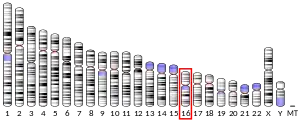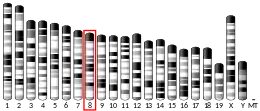CFDP1
Craniofacial development protein 1 is a protein that in humans is encoded by the CFDP1 gene.[5][6][7][8]
References
- GRCh38: Ensembl release 89: ENSG00000153774 - Ensembl, May 2017
- GRCm38: Ensembl release 89: ENSMUSG00000031954 - Ensembl, May 2017
- "Human PubMed Reference:". National Center for Biotechnology Information, U.S. National Library of Medicine.
- "Mouse PubMed Reference:". National Center for Biotechnology Information, U.S. National Library of Medicine.
- Takahashi I, Nobukuni T, Ohmori H, Kobayashi M, Tanaka S, Ohshima K, Okada N, Masui T, Hashimoto K, Iwashita S (Jul 1998). "Existence of a bovine LINE repetitive insert that appears in the cDNA of bovine protein BCNT in ruminant, but not in human, genomes". Gene. 211 (2): 387–94. doi:10.1016/S0378-1119(98)00136-X. PMID 9602175.
- Nobukuni T, Kobayashi M, Omori A, Ichinose S, Iwanaga T, Takahashi I, Hashimoto K, Hattori S, Kaibuchi K, Miyata Y, Masui T, Iwashita S (Mar 1997). "An Alu-linked repetitive sequence corresponding to 280 amino acids is expressed in a novel bovine protein, but not in its human homologue". J Biol Chem. 272 (5): 2801–7. doi:10.1074/jbc.272.5.2801. PMID 9006920.
- Diekwisch TG, Luan X (May 2002). "CP27 function is necessary for cell survival and differentiation during tooth morphogenesis in organ culture". Gene. 287 (1–2): 141–7. doi:10.1016/S0378-1119(01)00868-X. PMID 11992732.
- "Entrez Gene: CFDP1 craniofacial development protein 1".
External links
- Human CFDP1 genome location and CFDP1 gene details page in the UCSC Genome Browser.
Further reading
- Iwashita S (2002). "[A novel type protein, Bcnt, that includes the region derived from a long interspersed nucleotide element]". Seikagaku. 73 (12): 1435–8. PMID 11831036.
- Rual JF, Venkatesan K, Hao T, et al. (2005). "Towards a proteome-scale map of the human protein-protein interaction network". Nature. 437 (7062): 1173–8. doi:10.1038/nature04209. PMID 16189514. S2CID 4427026.
- Gerhard DS, Wagner L, Feingold EA, et al. (2004). "The status, quality, and expansion of the NIH full-length cDNA project: the Mammalian Gene Collection (MGC)". Genome Res. 14 (10B): 2121–7. doi:10.1101/gr.2596504. PMC 528928. PMID 15489334.
- Colland F, Jacq X, Trouplin V, et al. (2004). "Functional proteomics mapping of a human signaling pathway". Genome Res. 14 (7): 1324–32. doi:10.1101/gr.2334104. PMC 442148. PMID 15231748.
- Strausberg RL, Feingold EA, Grouse LH, et al. (2003). "Generation and initial analysis of more than 15,000 full-length human and mouse cDNA sequences". Proc. Natl. Acad. Sci. U.S.A. 99 (26): 16899–903. doi:10.1073/pnas.242603899. PMC 139241. PMID 12477932.
- Diekwisch TG, Marches F, Williams A, Luan X (1999). "Cloning, gene expression, and characterization of CP27, a novel gene in mouse embryogenesis". Gene. 235 (1–2): 19–30. doi:10.1016/S0378-1119(99)00220-6. PMID 10415329.
- Iwashita S, Nobukuni T, Tanaka S, et al. (1999). "Partial nuclear localization of a bovine phosphoprotein, BCNT, that includes a region derived from a LINE repetitive sequence in Ruminantia". Biochim. Biophys. Acta. 1427 (3): 408–16. doi:10.1016/s0304-4165(99)00049-5. PMID 10350657.
- Suzuki Y, Yoshitomo-Nakagawa K, Maruyama K, et al. (1997). "Construction and characterization of a full length-enriched and a 5'-end-enriched cDNA library". Gene. 200 (1–2): 149–56. doi:10.1016/S0378-1119(97)00411-3. PMID 9373149.
- Maruyama K, Sugano S (1994). "Oligo-capping: a simple method to replace the cap structure of eukaryotic mRNAs with oligoribonucleotides". Gene. 138 (1–2): 171–4. doi:10.1016/0378-1119(94)90802-8. PMID 8125298.
This article is issued from Wikipedia. The text is licensed under Creative Commons - Attribution - Sharealike. Additional terms may apply for the media files.




